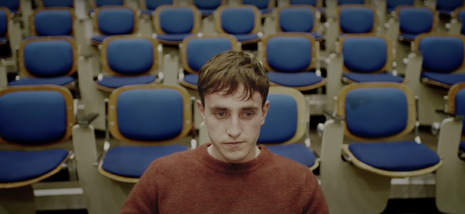Normal People and me
Deputy Editor Akshata Kapoor reflects on her pandemic freshers’ year and the parallels to be drawn with the show Normal People

I found myself tearing up while watching the fourth episode of BBC’s Normal People. No tragedy or heartbreak had taken place but there was something in Connell, the male protagonist’s silence, and the perplexed look on his face as he started his first day at university, that resonated with me. No dialogue, minimal background music: the scene was just a series of vignettes as Connell moved through the entrance of his college, walked to different classrooms, sat through a lecture, and finally went to study in the library. Even though he sat in a lecture room surrounded by strangers, and I watched pre-recorded videos on Moodle, there was a shared distance between our individual selves and our surroundings.
In Connell’s unnerving silent gaze and confused brows, I saw a piece of every moment of the past year in which I have questioned my degree choice because of, either, a new book I was unable to enjoy, or a supervision in which I had nothing to contribute. Creeping imposter syndrome, spontaneous moments of happiness, a strange sense of being afloat on an abandoned boat — Normal People echoed so many parts of my pandemic freshers year. In a somewhat romanticized sense, I think the show helped me to realize that the confusion I was experiencing was, indeed, normal.
“She’s hard to describe if you don’t know her”
I was struck by the moments of silence in Normal People, how it did not try to explain or reason with the inexplicable. During my Easter break, exhausted after a term of trying to balance an online presence as a student with an offline social presence, I kind of just shut down. All the lists of holiday reading I had prepared were left unopened on my laptop, the library books I borrowed and lugged across the country remained zipped up in my suitcase.
“The scenes were charged with so much more meaning by existing despite our expectations of what is meaningful or useful and what is not”
At this time, the recurring silent car rides in Normal People stood out to me: they showed the distances the characters covered without attempting to symbolize anything but the simple act of going from one place to another. Just because nothing was ‘achieved’ in these scenes didn’t make them unimportant. In fact, they were charged with so much more meaning by existing despite our expectations of what is meaningful or useful and what is not. Just as I was in a limbo with my work, these moments ‘in between’ in the show are there because the characters have no way to meaningfully deal with uncontrollable emotions and larger societal issues like misogyny, capitalism and mental health. They cannot help but sink back into the pauses where they can escape these forces.
Connell: “I did used to think I could read your mind at times, is that normal?”
Marianne: “No.”
There is a force in these solitary moments that moves them beyond points for reflection for the characters: the viewer is given time to linger on what has happened. The multiple lockdowns and international quarantines over the past year felt a bit like this. In my latest hotel quarantine after I returned home to Mumbai, no matter how much I tried to stay away from the screen, I inevitably ended up on my phone. I found myself in my photo gallery, going through photos of the past year, scrolling through the same old memes on social media, sitting through uneventful, boring, comforting FaceTime calls and zooms, every few seconds wondering what was going through the other person’s mind. Did they want to be on this call, or did they want to leave?
“I feel like a different person every day, as I move from the library to the hall and change the way I will talk to the next person I meet”
I couldn’t read their minds the same way Connell couldn’t read Marianne’s; the same way in which I felt confused halfway through the series, watching Marianne emerge from her introverted shell into a social butterfly at University. As the show reveals, Marianne was still grappling with mental health problems and turmoil back home, but we know none of this when we first watch her navigate social circles with the same ease with which I would open a new tab and resume watching Normal People every time I felt down. The reflective moments in the show allowed me to understand the need for reflection that doesn’t necessarily yield clear-cut answers, the silence that does not convey any message.
“I feel like I’m walking around, trying on a hundred different versions of myself”
As the lockdown relaxes and places open up, I find myself thinking about who I used to be over screen and who I am in person. I watched Normal People around the same time I started to have the delayed realization that I had completed my transition from school to uni, but also that I hadn’t really. Every time I felt a little more settled into my new lifestyle, I got the nagging feeling that I hadn’t really settled in, it was just some different version of me that had. And, when an easygoing, likeable character like Connell confessed that he tried on personalities like disguises, I felt a little better about coming to terms with it myself.
It made it easier to reconcile with how different everyone else seems as well: the friends at uni who I learn something new about every day (like I’m discovering a new version of them!), and friends back home who I haven’t kept in touch with and am too scared to now because I know they have changed. Myself too. Some friends claim I have changed significantly since coming to uni, some say I’m the same. To be honest, I feel like a different person every day, or even multiple times in a day as I move from the library to the hall and change the way I will talk to the next person I meet.
Connell: “I’ll go.”
Marianne: “And I’ll stay. And we’ll be okay”
Normal People is so intensely intimate that sometimes it feels like it’s just meant to be a show about Connell and Marianne, for Connell and Marianne. Like you’re intruding. And that’s what makes it so perfect. Because it is intimate, everything surrounding the couple becomes irrelevant in the more private moments. It’s a reminder that I can forget about everything else when I wish to. I can be intimate with the show in my own way, to connect with the individuals, the friends, and the music without dwelling on only the romance, and then to let them all go when I pause the show, or to linger on if I wish to. It’s a show about staying and letting go, a reminder that the pandemic and post-pandemic is a new normal that I can handle, because everything is always catastrophically changing, and yet it’s also always just normal.
 News / Caius mourns its tree-mendous loss23 December 2025
News / Caius mourns its tree-mendous loss23 December 2025 Comment / Yes, I’m brown – but I have more important things to say22 December 2025
Comment / Yes, I’m brown – but I have more important things to say22 December 2025 News / Cambridge welcomes UK rejoining the Erasmus scheme20 December 2025
News / Cambridge welcomes UK rejoining the Erasmus scheme20 December 2025 News / CUP announces funding scheme for under-represented academics19 December 2025
News / CUP announces funding scheme for under-represented academics19 December 2025 Interviews / Politics, your own way: Tilly Middlehurst on speaking out21 December 2025
Interviews / Politics, your own way: Tilly Middlehurst on speaking out21 December 2025











